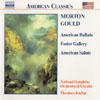Gould American Ballads; Foster Gallery; American Salute
First-rate performances and recordings of striking repertoire by one of America’s most versatile 20th-century musical personalities
View record and artist detailsRecord and Artist Details
Composer or Director: Morton Gould
Label: Naxos
Magazine Review Date: 2/2001
Media Format: CD or Download
Media Runtime: 74
Mastering:
DDD
Catalogue Number: 8 559005

Tracks:
| Composition | Artist Credit |
|---|---|
| American Ballads |
Morton Gould, Composer
Morton Gould, Composer Theodore Kuchar, Conductor Ukraine National Symphony Orchestra |
| Foster Gallery Suite |
Morton Gould, Composer
Morton Gould, Composer Theodore Kuchar, Conductor Ukraine National Symphony Orchestra |
| American Salute, 'When Johnny comes marching home' |
Morton Gould, Composer
Morton Gould, Composer Theodore Kuchar, Conductor Ukraine National Symphony Orchestra |
Author: Andrew Achenbach
Composer, conductor, pianist and arranger, New York-born Morton Gould (1913-76) could, it seems, turn his hand to almost anything. To my mind, that marvellous 1947 ballet score Fall River Legend has always been one of the great unsung treasures of American music, and the present valuable triptych serves up further ample evidence of Gould’s formidable craftsmanship and fabulous gift for orchestral colour.
First heard in a wartime broadcast over the Mutual Radio Network in February 1942, American Salute (a wonderfully exuberant orchestral fantasy on When Johnny Comes Marching Home) remains perhaps the most popular of all Gould’s compositions. Three years earlier, Fritz Reiner – the then recently appointed music director of the Pittsburgh Symphony – had commissioned the Foster Gallery Suite, a 35-minute, 13-movement hybrid of suite and variations for large orchestra using material by the great 19th-century American songsmith (including such indelible favourites as Camptown Races, Jeannie with the Light Brown Hair and O Susannah). It’s a delightfully affectionate, sharply inventive tribute, nowhere more so than in the fourth movement (‘Swanee River’), where Gould pares down his forces to just five instruments (flute, trumpet, trombone, violin and banjo – the size of one of Foster’s own transcriptions contained in his 1854 anthology, The Social Orchestra). The result is pure enjoyment from start to finish, as are the six substantial American Ballads of 1976, one of three bicentennial offerings from Gould’s pen (the others being the Labor Day cantata, Something to Do, and the Symphony of Spirituals). Again, one could hardly fail to be impressed by the sheer fertility and easy confidence of Gould’s communicative, stylish and often rewardingly thoughtful writing (try the gravely affecting ‘Memorials’, with its ghostly incorporation of Taps).
I’m happy to report that Theodore Kuchar draws some splendidly alert and idiomatic playing from his Ukrainian group, and the sound is most pleasing to match. A very positive recommendation and irresistible value for money, I’d say.'
First heard in a wartime broadcast over the Mutual Radio Network in February 1942, American Salute (a wonderfully exuberant orchestral fantasy on When Johnny Comes Marching Home) remains perhaps the most popular of all Gould’s compositions. Three years earlier, Fritz Reiner – the then recently appointed music director of the Pittsburgh Symphony – had commissioned the Foster Gallery Suite, a 35-minute, 13-movement hybrid of suite and variations for large orchestra using material by the great 19th-century American songsmith (including such indelible favourites as Camptown Races, Jeannie with the Light Brown Hair and O Susannah). It’s a delightfully affectionate, sharply inventive tribute, nowhere more so than in the fourth movement (‘Swanee River’), where Gould pares down his forces to just five instruments (flute, trumpet, trombone, violin and banjo – the size of one of Foster’s own transcriptions contained in his 1854 anthology, The Social Orchestra). The result is pure enjoyment from start to finish, as are the six substantial American Ballads of 1976, one of three bicentennial offerings from Gould’s pen (the others being the Labor Day cantata, Something to Do, and the Symphony of Spirituals). Again, one could hardly fail to be impressed by the sheer fertility and easy confidence of Gould’s communicative, stylish and often rewardingly thoughtful writing (try the gravely affecting ‘Memorials’, with its ghostly incorporation of Taps).
I’m happy to report that Theodore Kuchar draws some splendidly alert and idiomatic playing from his Ukrainian group, and the sound is most pleasing to match. A very positive recommendation and irresistible value for money, I’d say.'
Discover the world's largest classical music catalogue with Presto Music.

Gramophone Digital Club
- Digital Edition
- Digital Archive
- Reviews Database
- Full website access
From £8.75 / month
Subscribe
Gramophone Full Club
- Print Edition
- Digital Edition
- Digital Archive
- Reviews Database
- Full website access
From £11.00 / month
Subscribe
If you are a library, university or other organisation that would be interested in an institutional subscription to Gramophone please click here for further information.




